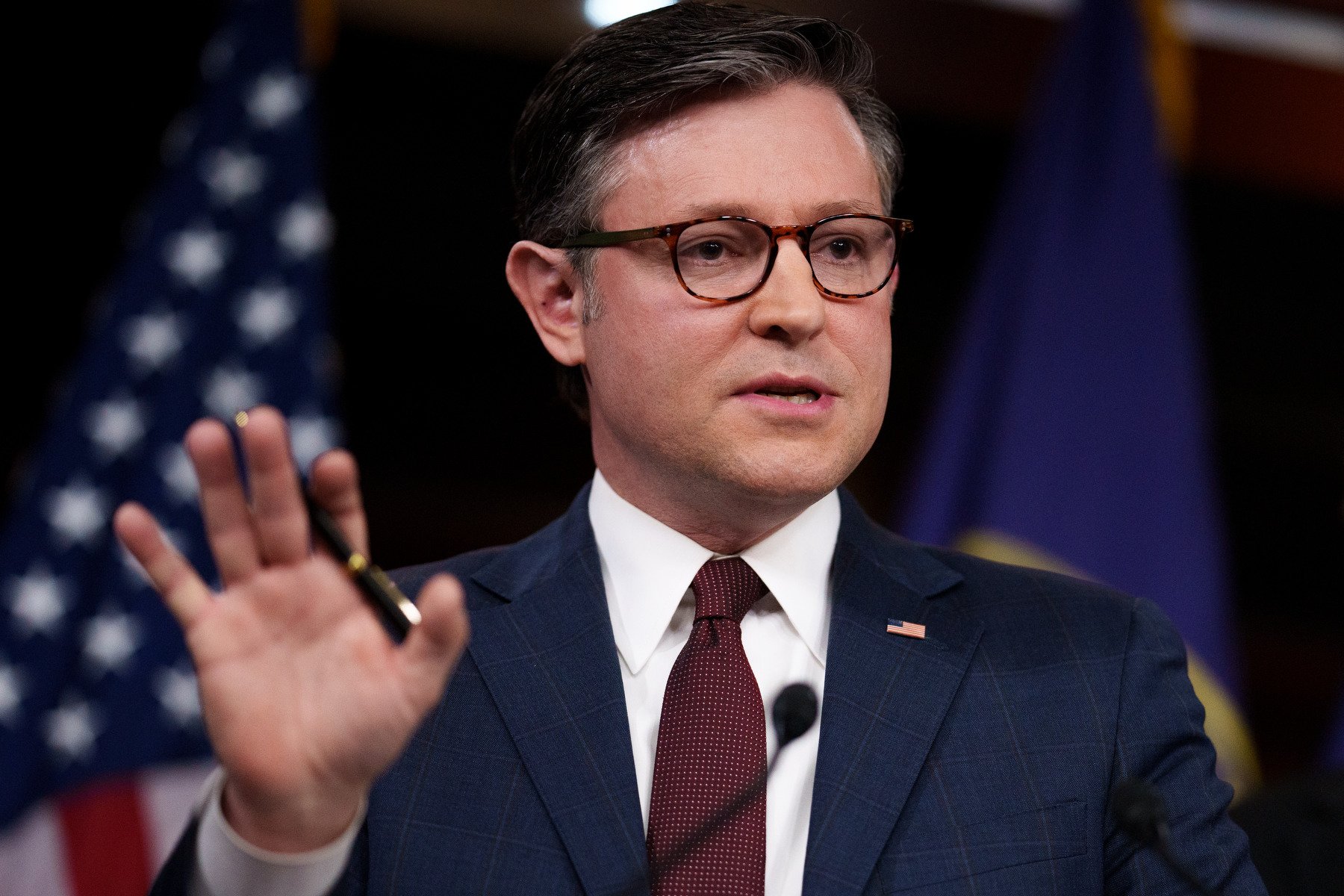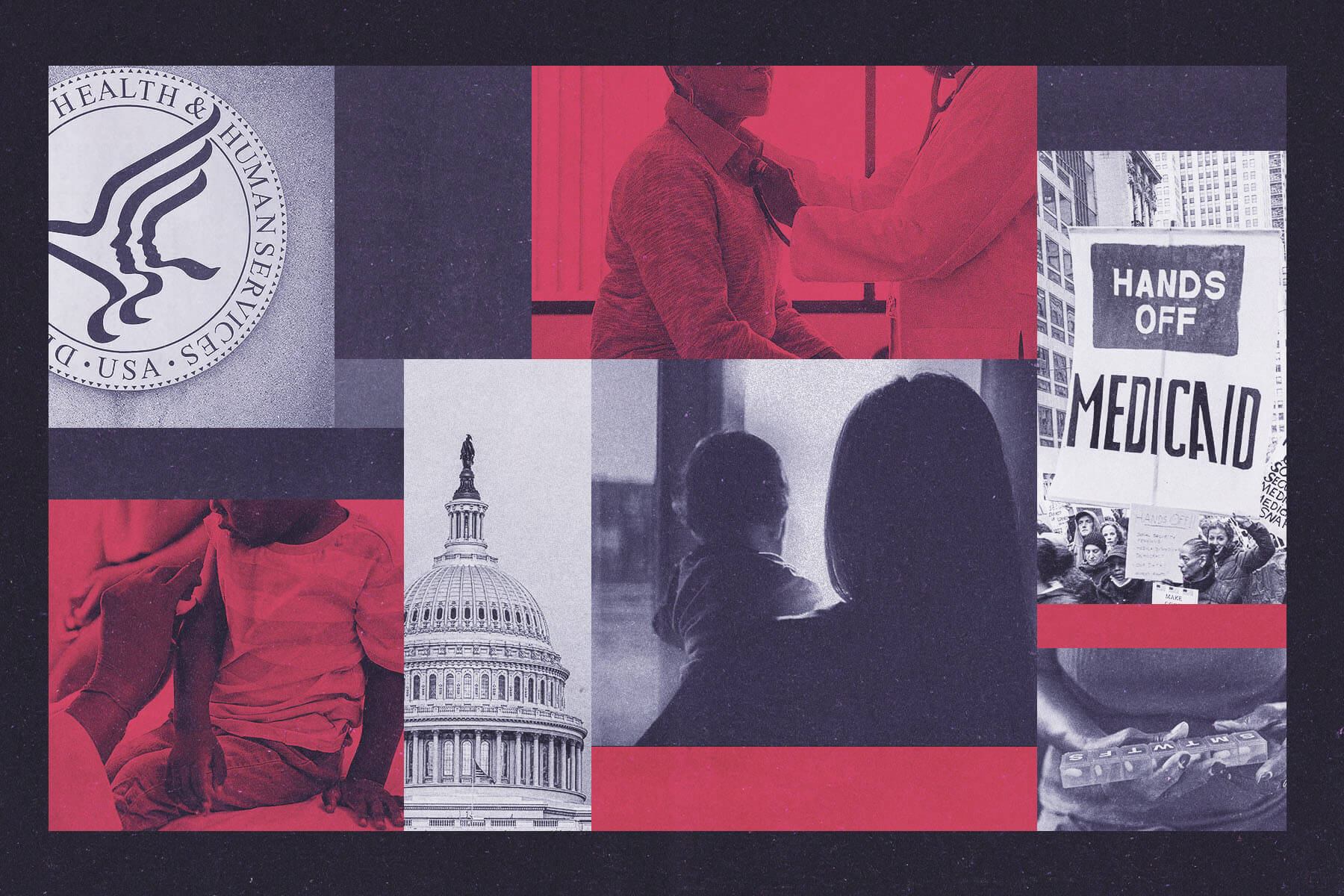As House Speaker Mike Johnson tries to sell massive Medicaid cuts, he is leaning on a messaging strategy straight from the White House playbook: a policy in the name of protecting women. But while the Republican lawmaker claims he’s targeting men who are allegedly freeloading off of the program, the changes could be detrimental to the very people he says he wants to protect.
For months, Johnson has championed nationwide work requirements, a policy that would make coverage contingent on a Medicaid recipient working or engaging in an approved activity like attending school. At least 60 percent of non-elderly Medicaid recipients already work. Medicaid is the nation’s health insurance program for low-income Americans, including caregivers, children and people with disabilities — people who are often unable to work. It covers nearly 80 million people.
“No one has talked about cutting one benefit in Medicaid to anyone who’s duly owed. What we’ve talked about is returning work requirements,” Johnson told reporters in early April. “So for example, you don’t have able-bodied young men on a program that’s designed for single mothers and the elderly and disabled. They’re draining resources from people who are actually due that. So if you clean that up and shore it up, you save a lot of money, and you return the dignity of work to young men who need to be out working instead of playing video games all day.”
Within days of his remarks on work requirements, Johnson argued that certain young men shouldn’t be on the program at all.
“We have to root out fraud, waste and abuse. We have to eliminate people on, for example, on Medicaid who are not actually eligible to be there — able-bodied workers, for example, young men who are — who should never be on the program at all,” he told Fox News.
There are no reliable estimates of how much fraud is in Medicaid, but experts note federal data shows health providers, not recipients, are more often linked to suspected fraud.

House Republicans are trying to find $1.5 trillion in spending cuts during current budget negotiations, including at least $880 billion over 10 years from the committee that oversees Medicaid, partly to pay for Trump’s tax policies that benefit wealthy Americans. In March, the Congressional Budget Office (CBO), a nonpartisan entity that acts as Congress’ bookkeeper, said in a letter that financing Trump’s tax agenda would require cuts to Medicaid.
President Donald Trump has often used the notion of protecting women to push his policy agenda, including as justification for policies that target transgender people and immigrants — the same tactics Johnson is using. But experts are clear about what the impact would be.
“There is no way to say that cuts to the Medicaid program can be done in a manner that is not going to harm women,” said Dorianne Mason, director of health equity at the National Women’s Law Center (NWLC).
Women and LGBTQ+ people, particularly women of color, transgender and nonbinary people, face greater barriers to employment — including forms of discrimination and harassment on the job. More than 6 in 10 of non-elderly Medicaid enrollees who were not working in 2021 were women, according to data compiled by NWLC.
Caregivers would also be harmed by work requirements, since such policies define work in ways that discount or ignore unpaid caregiving, according to policy experts. The role of caregiving disproportionately falls on women and LGBTQ+ people, and includes care for children, aging parents and other family members. Women already are more likely to hold low-paid jobs that don’t accommodate caregiving needs.
“When you have requirements like these that push people off of Medicaid, you’re really pushing people into economic insecurity about their health care,” said Mary-Beth Malcarney, senior adviser on Medicaid policy for Families USA. “Work reporting requirements don’t do anything to change the underlying need. They’re not improving health. They’re not improving employment. They’re not changing something about the private insurance market that makes that more affordable for people.”
Johnson’s message has parallels to a Republican-led political messaging strategy in the 1970s and 1980s that villainized so-called “welfare queens” who allegedly misused or abused government programs. The attack was racist and sexist, primarily implying Black women were taking advantage of the federal government.
“The trope before was the welfare queen. Now it is the lazy man who’s playing video games,” Mason said. “And just like that trope was offensive and inaccurate decades ago, this trope is also offensive and inaccurate. It’s really used to deny people who are eligible to access services — people who need these resources.”
In the mid-1970s, Chicago newspapers called an Illinois woman, Linda Taylor, a “welfare queen” after she was accused of defrauding such assistance programs. Taylor, who reportedly drove multiple vehicles and wore a mink coat, caught the attention of Ronald Reagan, who later successfully sought the presidency in part by using the case to argue against social safety net programs for low-income Americans.
Taylor’s ethnicity was ambiguous — she was perceived to be both Black and White at times — but her case and her nickname morphed into a negative stereotype about people of color who utilize government services. The subjectivity of who is worthy of care continues to drive policy debates today.
“When you have people on the program that are draining the resources, it takes it away from the people that are actually needing it the most and are intended to receive it. You’re talking about young single mothers, down on their fortunes at a moment, the people with real disabilities, the elderly. And we’ve got to protect and preserve that program. So we’re going to preserve the integrity of it in this process,” Johnson said in his remarks.
A spokesperson for Johnson did not immediately respond to the 19th’s request for comment.
Mason said any framing that questions whether “able-bodied” men should be enrolled in Medicaid would shut out an entire group of people who need care.
“Not everyone’s disability is explicit. Not everyone’s disability allows them to access coverage based on that disability,” Mason said, adding: “It’s those stereotypes around what ‘able-bodied’ even means, that someone may appear to be ‘able-bodied’ but may have a disability, that actually impacts whether they can access employment opportunities in the same way someone else can — especially when we’re talking about mental health as a potential disability.”
Although Johnson has been more public about his support for work requirements, his proposal to kick some men off the program altogether appears to be referencing enrollees of Medicaid expansion, a policy under the Affordable Care Act that has allowed more low-income people to qualify for the program. It includes people who previously might not have qualified for Medicaid but still only have an income up to 138 percent of the federal poverty level, which still represents some of the poorest people in America.
In Johnson’s Louisiana district, nearly 40 percent of his constituents are enrolled in Medicaid. At least 780,000 people in the state have coverage through Medicaid expansion.
The purpose of Medicaid expansion, a key pillar of President Barack Obama’s signature 2010 health care law, was to generally increase the number of people overall who can access health insurance. With the Affordable Care Act’s Medicaid expansion policy, more than 20 million have been able to enroll in Medicaid, and the uninsured rate is now one of the lowest in history.
“Medicaid expansion has been absolutely critical in reducing the uninsured rate,” said Joan Alker, executive director and co-founder of the Center for Children and Families at Georgetown University. “But it’s the exact same rhetoric, where they’re claiming that they’re protecting children and women — this has provided coverage to 17, 18 million people. This is a really big deal.”
The federal government pays for a bulk of Medicaid expansion costs, with states paying just 10 percent — a setup that was aimed at encouraging states to participate, especially after a 2012 Supreme Court ruling made it optional. To date, more than 40 states and the District of Columbia have Medicaid expansion through a mix of laws and voter-led referendums. The bulk of the holdouts are in Southern, Republican-led states.
Several congressional Republicans have begun to argue that the Medicaid expansion match should reflect the more traditional federal-state match for general recipients — which can range from 50 percent to 77 percent.
Republican Rep. Brett Guthrie of Kentucky, chair of a key House committee overseeing potential Medicaid cuts, posed a hypothetical where “a disabled child in Kentucky gets 72 cents when they go to the doctor” while recipients under the expansion policy have the 90-10 match.
“We know that’s just unsustainable,” Guthrie said. “We want to fix that so everybody gets coverage. So I think it’s going to be a really responsible response.”
The idea that the Medicaid expansion match setup needs to be lowered in order to be more fair is being echoed by Paragon Health Institute, a small conservative-leaning policy group that claims Medicaid expansion has created “discrimination” against pregnant women, the elderly, the disabled and children.
“It’s similar language — these ‘undeserving adults’ who are lying around on the couch when they’re only paying maybe 60 cents on the dollar for pregnant women or children,” Alker said. “What they really want to do is get rid of all of that extra funding for the expansion match, which will gut the expansion. They also want to put a work requirement on that population. So it’s all related.”
If states drop or reduce the expansion altogether, there will be a tangible impact on women and children: Medicaid expansion has been associated with greater access to timely treatment, including for non-elderly women with gynecologic cancer. It has also been associated with lower rates of maternal deaths compared to non-expansion states, with the largest drop among Black women.
Alker said massive cuts to Medicaid under the guise of protecting women and children is a “false dichotomy.” Almost half of the nation’s children are enrolled in the program, and child care professionals are often able to access health insurance because of Medicaid expansion.
“You’re not protecting children by taking coverage away from child care workers,” she said.
There are also a dozen states with so-called “trigger laws” that would end or change their expansion programs if the federal match drops. That would impact at least 4.3 million people in those states.
When the CBO analyzed the impact of work requirements in 2023, it estimated that work requirements would save the federal government more than $100 billion over 10 years. Eliminating Medicaid expansion would cut $1.7 trillion over the same period. A per capita cap on Medicaid spending, which would give states a fixed amount of money per enrollee, is another consideration that could see upwards of $1 trillion in federal spending cuts.
Mason said that it’s imperative that every single population have health insurance coverage, including men. Because there is a ripple effect, including financial strain on medical institutions that treat those other populations.
“Reducing access to Medicaid — it makes the individual sicker. It makes their families sicker. It makes their families more economically unstable. It makes our healthcare system weaker, and it makes our overall population sicker,” she said. “There literally is no win.”






